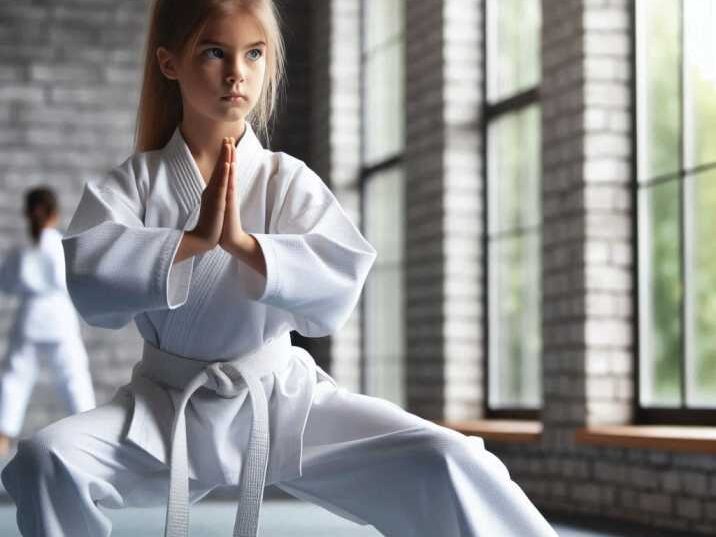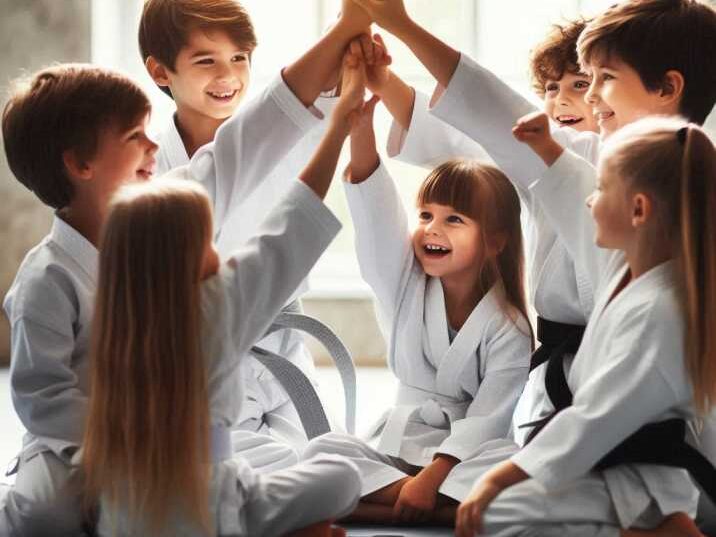Martial arts are more than just punches, kicks, and fancy moves. They teach discipline, focus, and self-control, which can be incredibly beneficial, especially those with which martial arts help kids with learning difficulties. But how exactly does martial arts help? In this article, we’ll explore how training in martial arts can boost confidence, improve concentration, and provide a fun way for kids to develop skills that will help them in school and in life.

Introduction
Table of Contents
For many kids, learning can be challenging, especially when they face difficulties such as ADHD, dyslexia, or other learning differences. These challenges can make it hard to focus in school, stay organized, and build confidence. However, martial arts offer a unique way to address these issues. Through structured practice and training, kids can develop important life skills that extend beyond the dojo and into the classroom. Let’s dive into how can make a difference with martial arts help kids with learning difficulties.
How Martial Arts Improve Focus
1. Discipline and Routine
One of the core components of martial arts is discipline. In every class, students are expected to follow a strict routine, pay attention to their instructor, and complete each move with precision. This repetition and adherence to structure help children develop self-discipline—a skill that is crucial for maintaining focus both in and out of the dojo. For kids with learning difficulties, establishing a routine can create a sense of security and predictability, which can improve their ability to concentrate on tasks.
2. Mindful Movement and Breathing
Martial arts teach kids to be aware of their movements and breathing. Practices like Tai Chi and Karate often include exercises that require students to move slowly and deliberately, focusing on each breath. This practice of mindful movement can help children develop better control over their bodies and minds, leading to improved focus in schoolwork and other activities.
Boosting Confidence and Self-Esteem
1. Achieving Goals through Belt Systems
In martial arts, progress is marked by earning different colored belts. Each belt represents a new level of skill and dedication. For kids with learning difficulties, the sense of accomplishment that comes with earning a new belt can be a powerful boost to their self-esteem. It shows them that they can achieve their goals through hard work and persistence, which can translate into more confidence in their academic abilities.
2. Learning to Handle Failure
Martial arts also teach kids how to deal with failure. Not every move will be perfect, and not every match will be a win. However, these setbacks provide valuable lessons in resilience. Children learn that mistakes are part of the learning process and that it’s okay to fail as long as they keep trying. This mindset can be incredibly beneficial in school, where kids often face challenges and need the courage to keep going.
Developing Social Skills and Teamwork
1. Respect and Communication
Martial arts emphasize respect—respect for the instructor, respect for fellow students, and respect for oneself. Through partner drills and sparring, children learn to communicate effectively and work with others. These interactions help them develop social skills that are crucial for making friends and cooperating in group settings, both in school and in everyday life.
2. Building a Sense of Belonging
For kids who struggle with learning difficulties, feeling like they belong can be challenging. Martial arts classes provide a supportive community where everyone is working towards similar goals. This environment can help children feel more connected and less isolated, giving them the confidence to participate more fully in school and other social activities.
Physical Benefits: Improving Coordination and Fitness
1. Enhancing Motor Skills
Many learning difficulties are accompanied by challenges with motor skills. Martial arts training involves complex movements that require coordination and balance. As kids practice kicks, punches, and stances, they naturally improve their motor skills, which can have a positive impact on their ability to perform everyday tasks and participate in sports.
2. Promoting Physical Fitness
Regular physical activity is known to benefit the brain, and martial arts provide an excellent workout. The combination of aerobic exercise and strength training helps improve overall physical fitness, which is linked to better concentration and reduced stress. This can be especially beneficial for children with ADHD, as physical activity helps them release excess energy and improve their ability to focus.
The Role of Martial Arts in Emotional Regulation
1. Managing Stress and Anxiety
Kids with learning difficulties often experience higher levels of stress and anxiety. Martial arts provide a safe and controlled environment where children can release pent-up energy and emotions. The focus on controlled breathing and mindfulness during training helps them learn to manage their emotions more effectively, reducing stress and anxiety both in and out of the dojo.
2. Building Emotional Resilience
Martial arts teach children to remain calm under pressure. Whether they are sparring with a partner or learning a new technique, they must stay focused and composed. This practice helps them build emotional resilience, making it easier to handle stressful situations at school and home without becoming overwhelmed.
Creating a Fun and Engaging Learning Environment
1. Keeping Kids Motivated
One of the challenges of traditional education is keeping kids, especially those with learning difficulties, motivated and engaged. Martial arts training offer a dynamic and interactive learning environment that keeps children excited about learning. The combination of physical activity, mental challenges, and the opportunity to progress through belt ranks keeps kids motivated to improve.

2. Encouraging Lifelong Learning
Martial arts training instill a love of learning that goes beyond the dojo. The skills and habits developed during training, such as goal-setting, perseverance, and continuous self-improvement, encourage kids to approach learning as a lifelong journey. This mindset can be particularly beneficial for children with learning difficulties, helping them see education as an opportunity rather than a challenge.
Conclusion
Martial arts offer a holistic approach to supporting children with learning difficulties. From improving focus and discipline to boosting confidence and physical fitness, the benefits extend far beyond the dojo and into all areas of life. For kids who struggle in traditional educational settings, martial arts provide an alternative way to learn important life skills in a fun, engaging, and supportive environment. Whether it’s through achieving a new belt, learning to stay calm under pressure, or simply feeling part of a team, martial arts can make a profound difference in a child’s life.
Table of Information about Martial Arts Help Kids with Learning Difficulties
| Benefit | How Martial Arts Helps |
|---|---|
| Improved Focus | Through discipline, routine, and mindful movement. |
| Enhanced Confidence | By achieving goals and learning to handle failure. |
| Better Social Skills | By teaching respect, communication, and providing a sense of belonging. |
| Physical Fitness and Coordination | By enhancing motor skills and promoting overall physical fitness. |
| Emotional Regulation | By managing stress, anxiety, and building emotional resilience. |
| Lifelong Learning | By encouraging a love for learning and setting goals. |
FAQs
1. Can martial arts help kids with ADHD?
Yes, martial arts can help kids with ADHD by improving focus, discipline, and self-control, making it easier for them to concentrate in school and other activities.
2. Is martial arts safe for children with learning difficulties?
Yes, martial arts are generally safe for children with learning difficulties, as long as they are taught by qualified instructors who understand their needs.
3. How often should my child practice martial arts?
For the best results, it’s recommended that children practice martial arts 2-3 times a week.
4. Will martial arts help my child do better in school?
Martial arts can improve focus, discipline, and self-esteem, all of which can contribute to better academic performance.
5. What type of martial arts is best for kids with learning difficulties?
Styles that emphasize discipline, focus, and mindfulness, such as Karate, Taekwondo, or Tai Chi, are often beneficial for children with learning difficulties.


